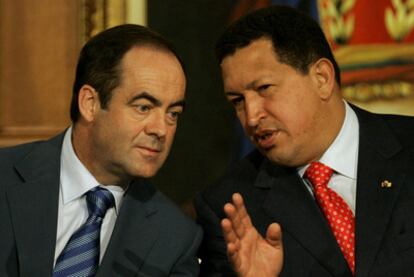Military sales to Venezuela produced a bitter ministerial rift in Madrid
Then-Defense chief Bono outflanked the Foreign Ministry, show US cables
The controversial sales of patrol boats and air transport planes to Venezuela put two Spanish ministers on bitter terms, and prevented Washington from immediately improving relations with Madrid, which were at a low point following the 2004 pullout of troops from Iraq, US Embassy cablegrams show.
Dozens of confidential documents released by WikiLeaks illustrate how the United States exerted pressure on the Zapatero government to keep Spain from selling military equipment to Venezuela's President Hugo Chávez. In the end, Spain sold the boats to Caracas but Washington blocked the sale of the planes by claiming rights to the air technology.
The episode put then-Defense Minister José Bono and then-Foreign Minister Miguel Ángel Moratinos at opposite ends of a tug-of-war. Washington was already perturbed by Chávez's "revolutionary rhetoric" and anti-US attacks he made during a 2004 visit to Madrid. The Spanish government apologized, saying that it invited Chávez because he had been insisting on coming for months.
"The ships will not carry missiles - please trust us," said a Defense official
"We are the world's eighth power but the US treats us like a fifth-rate power"
But it was the military sales agreement, signed by Bono in 2005 during a visit to Caracas, that pushed Washington over the edge. In February that year, the defense minister called the US Embassy to explain that Chávez had promised the patrol boats would only be used to guard Venezuela's Caribbean coast and not for offensive purposes. "The principal reason Spain was making the sale to Venezuela - reportedly worth over 600 million euros($780 million) - was to give a shot in the arm to ailing state-owned ship building firm Izar. The sale would be 'very significant for Izar,' said Bono, but would not tip the military balance in the region," wrote Chargé d'Affaires Robert Manzanares on February 24, 2005.
Days later, Javier Sandomingo, the Foreign Ministry's director for Latin America, told the Embassy that not only was the transaction closed but that it was causing "an energetic internal debate" within the government. The United States continued to show its concern and opposition over the sales in a series of meetings between diplomats and government officials, such as then-Deputy Prime Minister María Teresa Fernández de la Vega. Several sources inside the Foreign Ministry told the Embassy that they were uncomfortable with the transaction and claimed that Bono had pushed for the agreement despite strong opposition from the Foreign Ministry.
On April 20, 2005, Francisco Pardo, then-secretary of state for defense, met with Manzanares at the Embassy to demonstrate to diplomats that Spain wasn't selling "corvettes," as the opposition Popular Party was charging, but instead coastal patrol ships. Pardo then showed the chargé a copy of the agreement signed between Spain and Venezuela. "I do not have to show you this classified document [...] but I want us both to be absolutely clear on what we are and are not selling," Pardo said according to cable dated two days after the meeting.
When the defense attaché at the Embassy noted that ships could be outfitted to carry missiles, Pardo was "noticeably bothered." "The ships will not carry missiles - that's what I'm trying to explain. Please trust us," he said.
Bono also tried to calm US fears, insisting that even the United States sells weapons to Venezuela. At a July 6, 2005 meeting with then-US Ambassador Eduardo Aguirre, Bono explained that the actual transfer would not take place for six years and "it was highly unlikely that Chávez would still be in power by that time."
The issue became a recurring topic in bilateral relations. Spain wanted to ensure the sale but at the same time improve relations with the United States.
On December 22, 2005, Aguirre called on Moratinos. The ambassador told him that the US government was aware that he "had made a good faith effort to derail the weapons deal, but had been outflanked by [...] José Bono.
"Moratinos acknowledged the basic facts of the issue and said that both he and Deputy FM Bernardino León had believed they had successfully turned off the aircraft component of the sale at the time they approached the ambassador. However, [...] Bono did eventually win the internal debate and proceed with the sale," Aguirre wrote in one cable.
On January 12, 2006, the ambassador again met with Moratinos to tell him that the US government had decided to deny the Spanish technology license transfer for the EADS/CASA transport planes Spain promised to sell Venezuela.
"We are the eighth-largest power in the world but the [US government] treats us like a fifth-rate power," Moratinos told the ambassador. "We want to work with you, but need a minimal political signal that you want to work with us. We need to demonstrate that the bilateral relations are on track and are not just about what we are doing in Venezuela and Cuba."
US pressure to cancel the patrol boat sale diminished but didn't completely disappear. In 2007, when Washington saw that relations between Spain and Venezuela were beginning to deteriorate, it offered Madrid a list of alternative buyer-nations for the boats. But the transaction remained intact. Most of the boats have since been delivered to Chávez.

Zapatero "walks a fine line" in releasing ETA murderer
The US Embassy quickly dismissed the theory that ETA, not Al Qaeda, was behind the March 11, 2004 Madrid train bombings, US Embassy cables show.
In more than 200 cablegrams between Madrid and Washington sent from 2004 to 2010 that mention ETA, there is no trace of any type of special cooperation between Spain and the United States in the fight against Basque terrorism. Instead, following the terrorist attack on the trains, US diplomats expressed frustration with the Spanish government's focus on battling ETA and what they perceived as a lesser emphasis on eradicating Islamist radical groups. US diplomats continued to periodically pressure the Spanish government to change its mentality over terrorism.
"Despite the passage of more than two and a half years since the Madrid train bombings occurred on March 11, 2004, and the near universal acceptance by the Spanish public and terrorism experts that they were perpetrated by Al Qaeda sympathizers with the goal to punish Spain for its participation in the Iraq War, a segment of the opposition Popular Party (PP) and the newspaper El Mundo continue to allege a Socialist Party conspiracy and cover-up, and claim that the Basque terrorist group ETA had some link with the March 11 attacks," reads a cable dated October 20, 2006. In a prior cable classified as "secret" and dated April 7, 2005, US diplomats recognized that Spanish police had tripled their investigations into Islamic extremist groups since the Madrid train bombings, but they also had to face public and political pressure to concentrate their efforts on ETA.
On September 13, 2007, the Embassy in Madrid sent a lengthy cable to Dell Dailey, counterterrorism coordinator at the State Department, saying that Spanish authorities faced a difficult task in investigating Islamic groups because they had just begun to focus on these types of criminal activities after the March 11 tragedy. The bombings left 191 dead and more than 2,000 injured.
At the same time, then-US Ambassador Eduardo Aguirre also said that Prime Minister José Luis Rodríguez Zapatero "was walking a fine line" in agreeing to allow convicted ETA assassin José Ignacio de Juana Chaos, who was on a hunger strike, to serve the remainder of his lengthy prison sentence under house arrest.
"As the De Juana episode makes clear, Zapatero is willing to raise the ante in pursuit of avoiding violence and furthering the Basque peace process, which he views as the central legacy of his administration.
"To a significant extent, he has placed his political future in ETA's hands. In fact, many within Zapatero's PSOE ranks privately believe that these high stakes are unreasonable, particularly in the wake of the December 30 ETA bombing at Barajas airport," Aguirre wrote on March 8, 2007.
Tu suscripción se está usando en otro dispositivo
¿Quieres añadir otro usuario a tu suscripción?
Si continúas leyendo en este dispositivo, no se podrá leer en el otro.
FlechaTu suscripción se está usando en otro dispositivo y solo puedes acceder a EL PAÍS desde un dispositivo a la vez.
Si quieres compartir tu cuenta, cambia tu suscripción a la modalidad Premium, así podrás añadir otro usuario. Cada uno accederá con su propia cuenta de email, lo que os permitirá personalizar vuestra experiencia en EL PAÍS.
En el caso de no saber quién está usando tu cuenta, te recomendamos cambiar tu contraseña aquí.
Si decides continuar compartiendo tu cuenta, este mensaje se mostrará en tu dispositivo y en el de la otra persona que está usando tu cuenta de forma indefinida, afectando a tu experiencia de lectura. Puedes consultar aquí los términos y condiciones de la suscripción digital.
































































